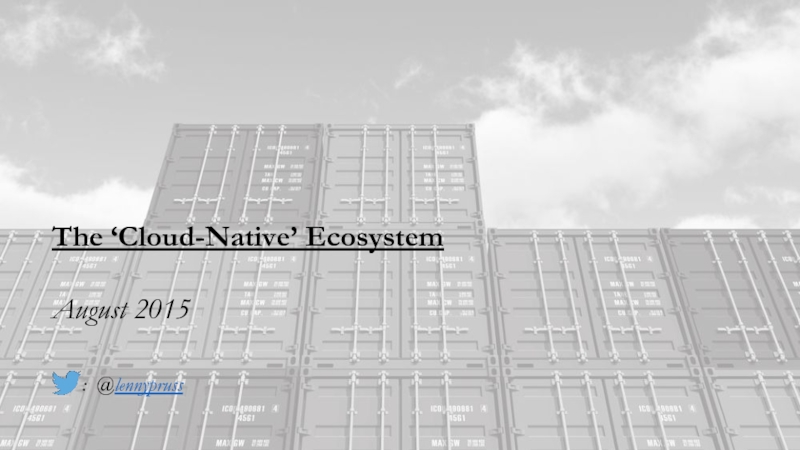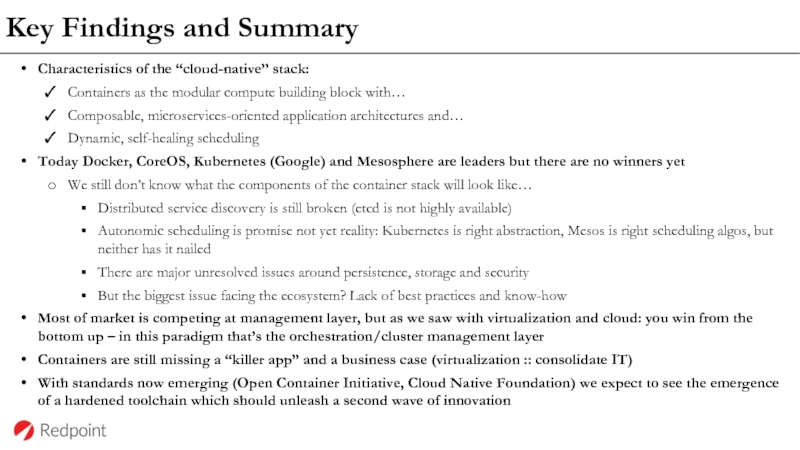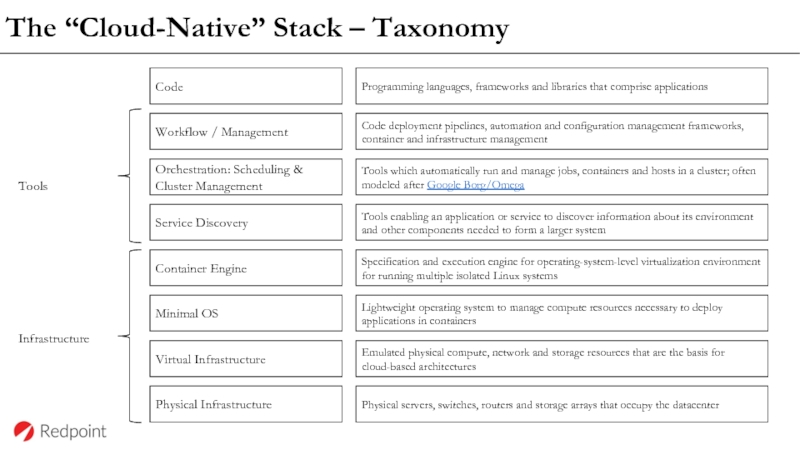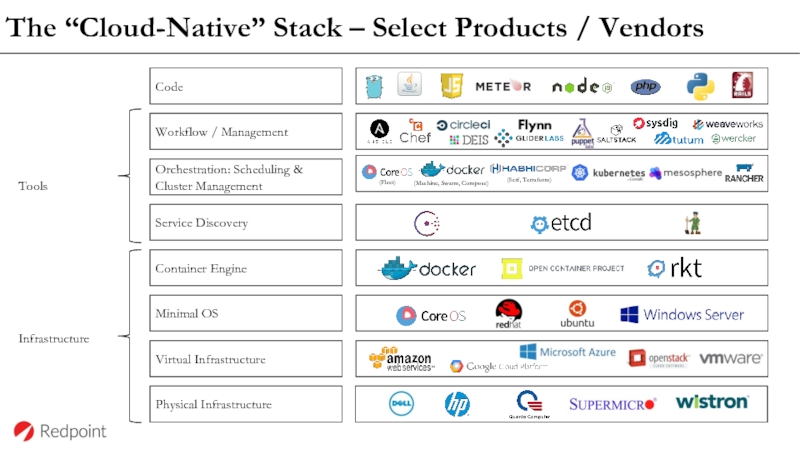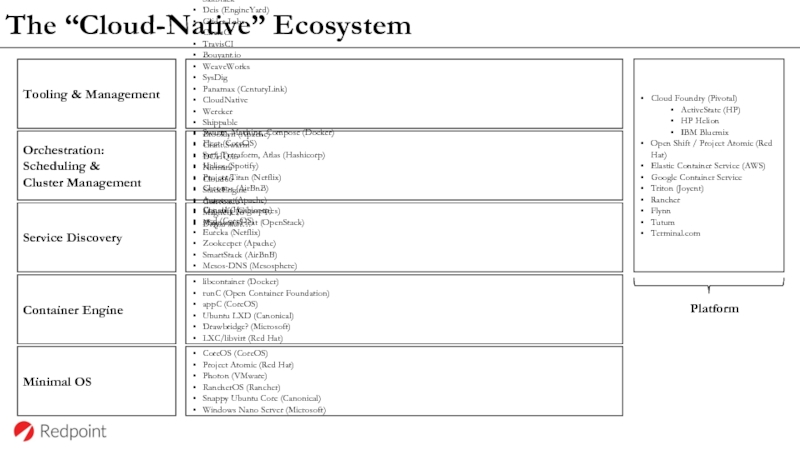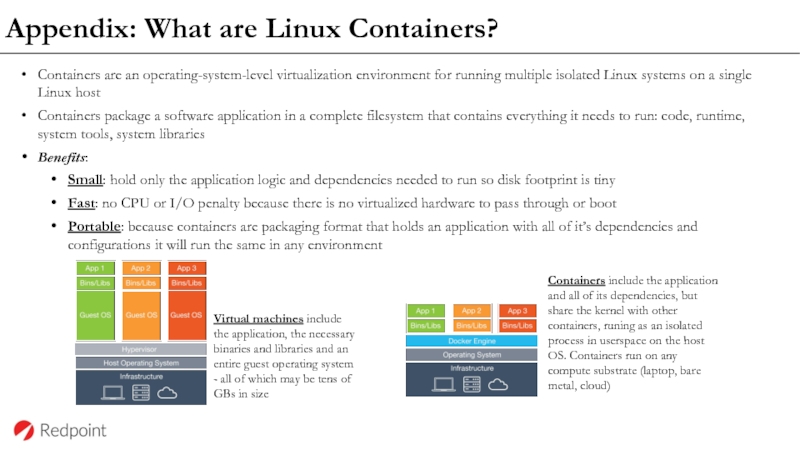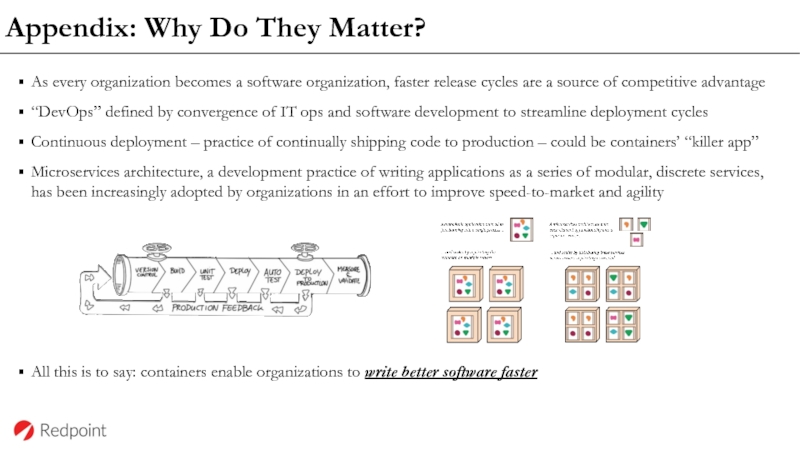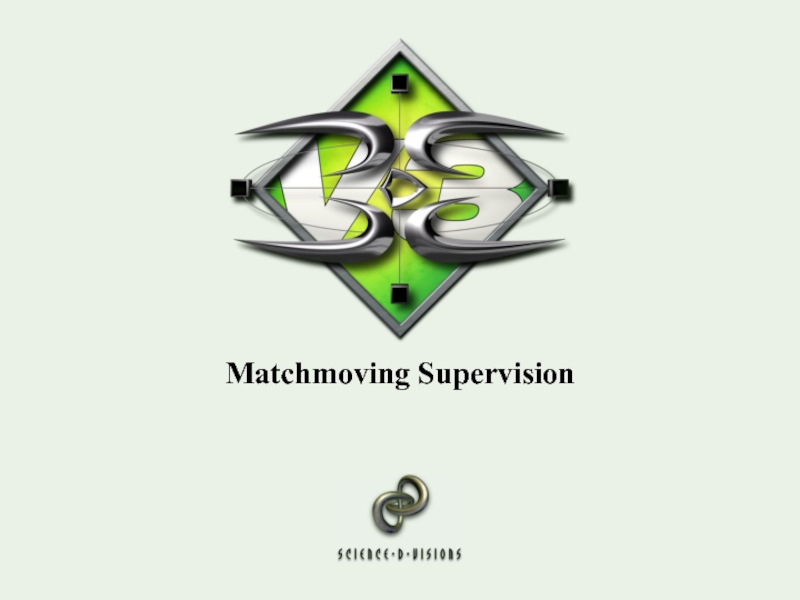- Главная
- Разное
- Дизайн
- Бизнес и предпринимательство
- Аналитика
- Образование
- Развлечения
- Красота и здоровье
- Финансы
- Государство
- Путешествия
- Спорт
- Недвижимость
- Армия
- Графика
- Культурология
- Еда и кулинария
- Лингвистика
- Английский язык
- Астрономия
- Алгебра
- Биология
- География
- Детские презентации
- Информатика
- История
- Литература
- Маркетинг
- Математика
- Медицина
- Менеджмент
- Музыка
- МХК
- Немецкий язык
- ОБЖ
- Обществознание
- Окружающий мир
- Педагогика
- Русский язык
- Технология
- Физика
- Философия
- Химия
- Шаблоны, картинки для презентаций
- Экология
- Экономика
- Юриспруденция
The ‘Cloud-Native’ Ecosystem August 2015 : @lennypruss презентация
Содержание
- 1. The ‘Cloud-Native’ Ecosystem August 2015 : @lennypruss
- 2. Characteristics of the “cloud-native” stack: Containers as
- 3. The “Cloud-Native” Stack – Taxonomy Physical
- 4. The “Cloud-Native” Stack – Select Products /
- 5. The “Cloud-Native” Ecosystem Consul (Hashicorp) etcd
- 6. Appendix: What are Linux Containers? Virtual machines
- 7. Appendix: Why Do They Matter? As
Слайд 2Characteristics of the “cloud-native” stack:
Containers as the modular compute building block
Composable, microservices-oriented application architectures and…
Dynamic, self-healing scheduling
Today Docker, CoreOS, Kubernetes (Google) and Mesosphere are leaders but there are no winners yet
We still don’t know what the components of the container stack will look like…
Distributed service discovery is still broken (etcd is not highly available)
Autonomic scheduling is promise not yet reality: Kubernetes is right abstraction, Mesos is right scheduling algos, but neither has it nailed
There are major unresolved issues around persistence, storage and security
But the biggest issue facing the ecosystem? Lack of best practices and know-how
Most of market is competing at management layer, but as we saw with virtualization and cloud: you win from the bottom up – in this paradigm that’s the orchestration/cluster management layer
Containers are still missing a “killer app” and a business case (virtualization :: consolidate IT)
With standards now emerging (Open Container Initiative, Cloud Native Foundation) we expect to see the emergence of a hardened toolchain which should unleash a second wave of innovation
Key Findings and Summary
Слайд 3The “Cloud-Native” Stack – Taxonomy
Physical Infrastructure
Virtual Infrastructure
Minimal OS
Container Engine
Service Discovery
Orchestration:
Workflow / Management
Code
Tools
Infrastructure
Programming languages, frameworks and libraries that comprise applications
Code deployment pipelines, automation and configuration management frameworks, container and infrastructure management
Tools which automatically run and manage jobs, containers and hosts in a cluster; often modeled after Google Borg/Omega
Tools enabling an application or service to discover information about its environment and other components needed to form a larger system
Specification and execution engine for operating-system-level virtualization environment for running multiple isolated Linux systems
Lightweight operating system to manage compute resources necessary to deploy applications in containers
Emulated physical compute, network and storage resources that are the basis for cloud-based architectures
Physical servers, switches, routers and storage arrays that occupy the datacenter
Слайд 4The “Cloud-Native” Stack – Select Products / Vendors
(Machine, Swarm, Compose)
(Serf, Terraform)
Physical
Virtual Infrastructure
Minimal OS
Container Engine
Service Discovery
Orchestration: Scheduling & Cluster Management
Workflow / Management
Code
Tools
(Fleet)
Infrastructure
Слайд 5The “Cloud-Native” Ecosystem
Consul (Hashicorp)
etcd (CoreOS)
Eureka (Netflix)
Zookeeper (Apache)
SmartStack (AirBnB)
Mesos-DNS (Mesosphere)
Minimal OS
Container
Service Discovery
Orchestration: Scheduling & Cluster Management
Tooling & Management
Cloud Foundry (Pivotal)
ActiveState (HP)
HP Helion
IBM Bluemix
Open Shift / Project Atomic (Red Hat)
Elastic Container Service (AWS)
Google Container Service
Triton (Joyent)
Rancher
Flynn
Tutum
Terminal.com
CoreOS (CoreOS)
Project Atomic (Red Hat)
Photon (VMware)
RancherOS (Rancher)
Snappy Ubuntu Core (Canonical)
Windows Nano Server (Microsoft)
libcontainer (Docker)
runC (Open Container Foundation)
appC (CoreOS)
Ubuntu LXD (Canonical)
Drawbridge? (Microsoft)
LXC/libvirt (Red Hat)
Kubernetes (Google/CoreOS)
Mesos, Marathon (Mesosphere)
Swarm, Machine, Compose (Docker)
Fleet (CoreOS)
Serf, Terraform, Atlas (Hashicorp)
Helios (Spotify)
Project Titan (Netflix)
Chronos (AirBnB)
Auroroa (Apache)
Cloudify (Gigaspaces)
Magnum+Heat (OpenStack)
Chef
Puppet
Ansible
SaltStack
Deis (EngineYard)
Glider Labs
CircleCI
TravisCI
Bouyant.io
WeaveWorks
SysDig
Panamax (CenturyLink)
CloudNative
Wercker
Shippable
Brooklyn (Apache)
Giant Swarm
DCHQ.io
Nirmata
Cloud66
StackEngine
Convox.io
Magnetic.io
Dozens more…
Platform
Слайд 6Appendix: What are Linux Containers?
Virtual machines include the application, the necessary
Containers include the application and all of its dependencies, but share the kernel with other containers, runing as an isolated process in userspace on the host OS. Containers run on any compute substrate (laptop, bare metal, cloud)
Containers are an operating-system-level virtualization environment for running multiple isolated Linux systems on a single Linux host
Containers package a software application in a complete filesystem that contains everything it needs to run: code, runtime, system tools, system libraries
Benefits:
Small: hold only the application logic and dependencies needed to run so disk footprint is tiny
Fast: no CPU or I/O penalty because there is no virtualized hardware to pass through or boot
Portable: because containers are packaging format that holds an application with all of it’s dependencies and configurations it will run the same in any environment
Слайд 7Appendix: Why Do They Matter?
As every organization becomes a software
“DevOps” defined by convergence of IT ops and software development to streamline deployment cycles
Continuous deployment – practice of continually shipping code to production – could be containers’ “killer app”
Microservices architecture, a development practice of writing applications as a series of modular, discrete services, has been increasingly adopted by organizations in an effort to improve speed-to-market and agility
All this is to say: containers enable organizations to write better software faster
